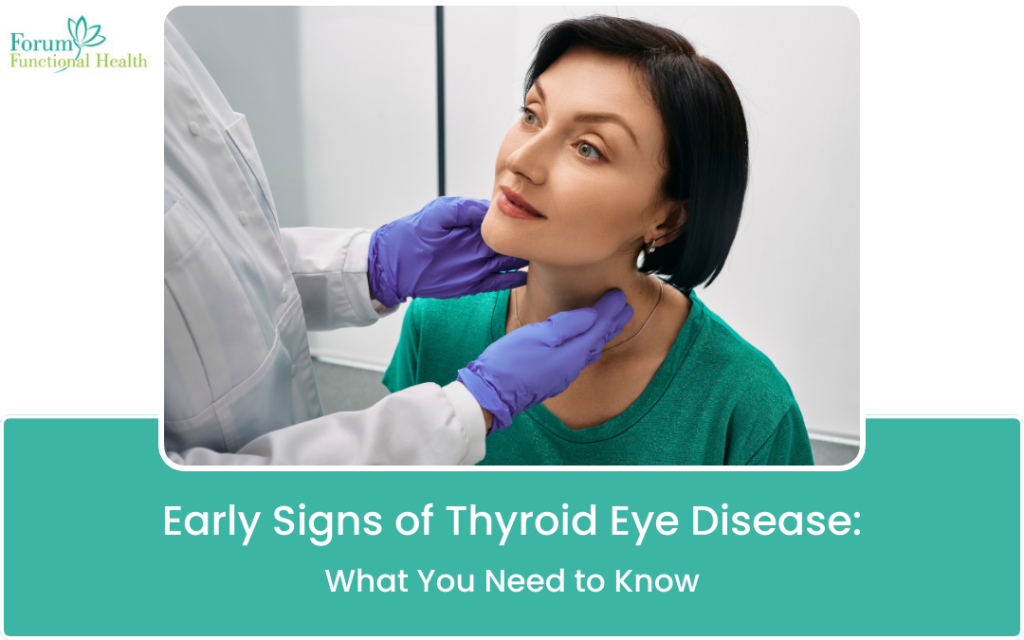Early Signs of Thyroid Eye Disease: What You Need to Know

Thyroid Eye Disease (TED), also known as Graves’ Orbitopathy, is a condition that can significantly impact your quality of life. Understanding the early signs of TED is crucial for timely diagnosis and treatment. At the Forum Functional Health Center, we aim to provide you with essential information to help you recognize these signs and take proactive steps toward managing this condition. If you’re experiencing symptoms related to thyroid disease, our expert team at the Functional Health Center in Texas is here to guide you through the process of diagnosis and treatment.
What is Thyroid Eye Disease?
Thyroid Eye Disease is an autoimmune disorder often associated with hyperthyroidism or Graves’ disease. It affects the tissues around the eyes, causing inflammation and swelling. This can lead to a range of symptoms, from mild discomfort to more severe issues such as bulging eyes and vision problems. Understanding TED’s early signs can help you seek treatment early and prevent complications.
Recognizing Early Symptoms of Thyroid Eye Disease
- Persistent Dry Eyes
One of the early signs of TED is a persistent feeling of dryness or grittiness in the eyes. This occurs because the inflammation and swelling around the eyes can interfere with the normal production of tears. If you find yourself frequently using eye drops or experiencing discomfort, it may be an indication of TED.
- Eye Redness and Swelling
Redness and swelling around the eyes can be a noticeable early symptom of TED. The inflammation caused by the disease can make your eyes appear puffy and irritated. If you notice that your eyes look swollen or redder than usual, it’s essential to consult with a healthcare professional.
- Protruding Eyes (Exophthalmos)
Exophthalmos, or bulging eyes, is a hallmark sign of advanced TED, but it can start subtly. You might notice that your eyes seem to stick out more than usual or that your eyelids are not closing completely. This can cause additional issues, such as difficulty blinking or discomfort in bright light.
- Difficulty Moving the Eyes
If you experience difficulty moving your eyes or feel that your eyes are restricted in their movement, it could be an early sign of TED. The inflammation in the eye muscles can limit their ability to move freely, affecting your range of vision.
- Double Vision
Double vision, or diplopia, is another symptom that can develop with TED. This occurs when the inflammation affects the muscles controlling eye movement, causing the eyes to misalign. If you experience double vision or have trouble focusing, it’s important to seek medical attention.
Why Early Diagnosis is Crucial
Early diagnosis of Thyroid Eye Disease is essential to managing the condition effectively and preventing complications. At the Forum Functional Health Center, we specialize in comprehensive Thyroid Disease Treatment in McKinney and can help you address TED with personalized care plans. Recognizing the early signs and seeking treatment promptly can make a significant difference in your overall health and quality of life.
What to Expect During Diagnosis
When you visit a Functional Health Center in Texas for evaluation, your healthcare provider will perform a thorough examination. This may include:
- Medical History Review: Discussing your symptoms, medical history, and any existing thyroid conditions.
- Eye Examination: Evaluating the health of your eyes and their movement.
- Imaging Tests: Using CT scans or MRIs to assess the extent of inflammation and swelling around the eyes.
- Blood Tests: Checking thyroid hormone levels to determine if there is an underlying thyroid condition contributing to TED.
Treatment Options for Thyroid Eye Disease
Treatment for TED aims to reduce inflammation, manage symptoms, and address any underlying thyroid issues. Options may include:
- Medications: Anti-inflammatory drugs or corticosteroids to reduce swelling and pain.
- Radiation Therapy: Targeted therapy to reduce inflammation in the eye tissues.
- Surgery: In more severe cases, surgical intervention may be necessary to correct eye positioning or improve vision.
Managing TED with Lifestyle Adjustments
In addition to medical treatments, lifestyle adjustments can help manage the symptoms of TED. Maintaining good eye hygiene, using artificial tears to keep your eyes moist, and avoiding irritants such as smoke or strong chemicals can be beneficial. Regular follow-ups with your healthcare provider at the Forum Functional Health Center will help monitor your condition and adjust treatment as needed.
Emotional Impact of Thyroid Eye Disease
Dealing with Thyroid Eye Disease can be emotionally challenging. The visible changes in your appearance and the discomfort associated with TED can affect your self-esteem and mental well-being. It’s essential to seek support from friends, family, or a mental health professional if you’re feeling overwhelmed.
Conclusion
Understanding and recognizing the early signs of Thyroid Eye Disease can lead to timely intervention and better management of the condition. If you suspect you have TED or are experiencing symptoms, don’t hesitate to Contact Forum Functional Health Center. Our team is dedicated to providing comprehensive Thyroid Disease Treatment in McKinney and supporting you on your path to better health.
Read More:- Can Thyroid Disease Lead to High Cholesterol? Understanding the Connection
